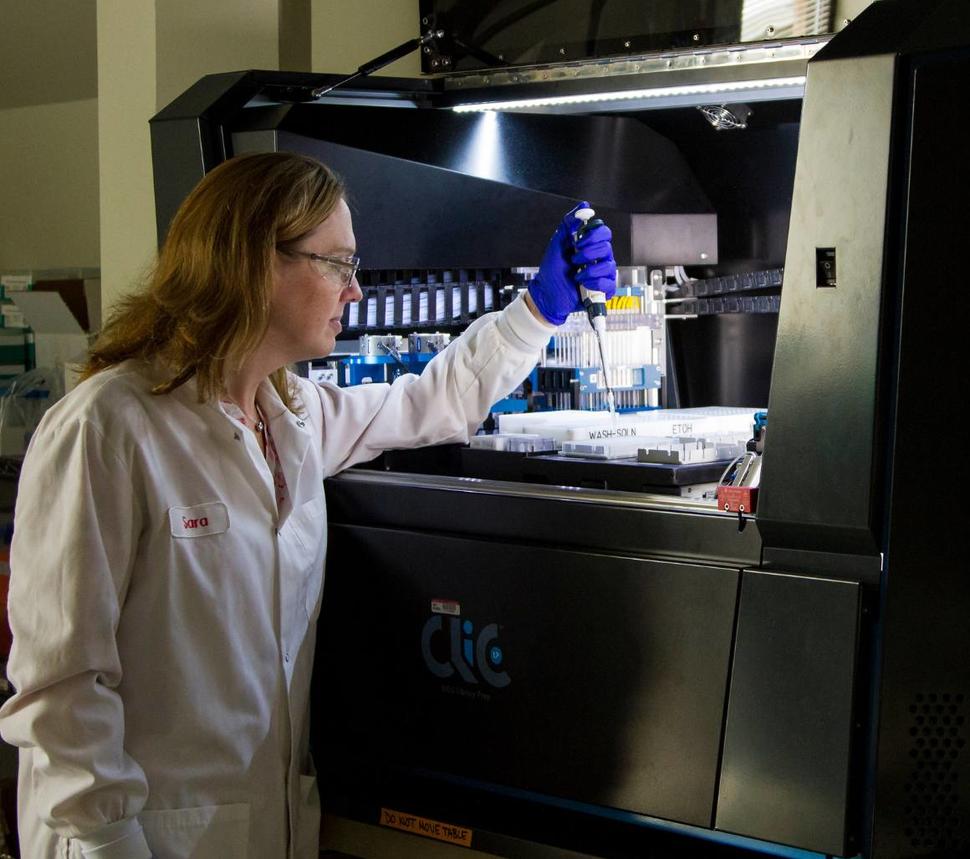This project is designed to interrogate the relationship between sequence changes in the HPV genome and carcinogenicity. There is huge variability in risk of precancer and cancer conferred by different human papillomavirus (HPV) types that is poorly explained. HPV type 16 is known to cause half of all cervical cancer cases worldwide, however, the specific reason for its carcinogenicity has been elusive.
The simple question is “Why is HPV 16 so uniquely carcinogenic?” High-throughput, next-generation sequencing methods are being used to study HPV 16 variant sub-lineages among women with cancer and cervical intraepithelial neoplasia 3 (CIN 3) in comparison to women with benign HPV infections. An Ampliseq/Ion Torrent-based assay for high-throughput whole-genome sequencing of HPV 16 was developed in 2015 (Cullen et al, 2015).
The team has demonstrated the reliability, reproducibility, accuracy, and usefulness of this assay for HPV16 and expanded it to the other 13 carcinogenic types. A global, high-risk HPV genome sequencing method has been developed and is being used to compare HPV16-related types to HPV16. Using the HPV 16 assay, investigators sequenced the entire HPV 16 genome in samples from over 3,200 infected women and classified the viruses into lineages and sublineages. Through this process, they discovered considerable risk differences for precancer and cancer and identified specific variant sublineages that strongly influence HPV 16 carcinogenicity and histologic outcome (Mirabello et al, 2016).
Further, investigators compared HPV 16 genomic sequences between cases and controls and discovered that controls, who had benign infections, had infections with significantly more protein-changing variants throughout the genome, while cases had infections devoid of protein-changing variants particularly in the E7 oncogene (Mirabello et al, 2017). These findings contribute to resolving the outstanding question of why common and typically benign HPV 16 infections only sometimes cause cancer. Follow-up work on the potent carcinogenicity of an intact HPV16 E7 protein is underway.
Additional case-control and prospective approaches are being used to determine how HPV genetic variation informs our understanding of carcinogenesis and influences risk for cancer. Studies are underway to evaluate all the HR-HPV types at the cervix and non-cervical sites, and evaluations of the interplay of host-viral genetics.
DCEG experts have also developed a novel Next-Generation Sequencing HPV genotyping assay based on their HPV genome sequencing. The new approach provides low-cost, high-throughput genotyping that will lead to major cost-savings for large cervical cancer screening and vaccination studies conducted by DCEG and other research groups since most current genotyping assays are expensive and laborious.
For more information, contact Lisa Mirabello.
References
Kuhs KAL, et al. Genetic variation within the human papillomavirus type 16 genome is associated with oropharyngeal cancer prognosis. Annals of Oncology. 2022.
Pinheiro M, et al. Phylogenomic Analysis of Human Papillomavirus Type 31 and Cervical Carcinogenesis: A Study of 2093 Viral Genomes. Viruses. 2021.
Faden DL, et al. APOBEC Mutagenesis Is Concordant between Tumor and Viral Genomes in HPV-Positive Head and Neck Squamous Cell Carcinoma. Viruses. 2021.
Pinheiro M, et al. Association of HPV35 with cervical carcinogenesis among women of African ancestry: Evidence of viral-host interaction with implications for disease intervention. Intl J Cancer. 2020.
Zhu B, et al. Mutations in the HPV16 genome induced by APOBEC3 are associated with viral clearance. Nat Commun. 2020.
Clifford GM, et al. Human papillomavirus 16 sub-lineage dispersal and cervical cancer risk worldwide: Whole viral genome sequences from 7116 HPV16-positive women. Papillomavirus Res. 2019.
Mirabello L, et al. HPV 16 E7 genetic conservation is critical to carcinogenesis. Cell. 2017.
Mirabello L, et al. HPV 16 sublineage associations with histology-specific cancer risk using HPV whole-genome sequences in 3200 women. J Natl Cancer Inst. 2016.
Cullen M, et al. Deep sequencing of HPV 16 genomes: A new high-throughput tool for exploring the carcinogenicity and natural history of HPV 16 infection. Papillomavirus Res. 2015.
